Scholars, visiting faculty, leaders represent Chicago as AAAS fellows
The American Academy of Arts and Sciences has announced that nine University faculty members have been elected 2009 fellows.
Elected to the academy this year are: Andrew Abbott, the Gustavus F. and Ann M. Swift Distinguished Service Professor in Sociology and the College; Spencer Janney Bloch, the R.M. Hutchins Distinguished Service Professor in Mathematics; Robert Fefferman, Dean of the Physical Sciences Division and the Max Mason Distinguished Service Professor in Mathematics; Craig Hogan, Professor in Astronomy & Astrophysics; Norman Nie, Professor Emeritus in Political Science; Raghuram Rajan, the Eric J. Gleacher Distinguished Service Professor of Finance at Chicago Booth; Neil Shubin, the Robert R. Bensley Professor and Associate Dean of Organismal Biology & Anatomy; Robert von Hallberg, the Helen A. Regenstein Professor in Comparative Literature and the College; David Wellbery, the Leroy T. and Margaret Deffenbaugh Carlson University Professor in Germanic Studies and the College.
Also elected to the academy were James Crown, Former Chairman of the Board of Trustees; Jas Elsner, Visiting Professor in Art History, who was elected as a Foreign Honorary Member; Danielle Allen, Visiting Professor and Research Associate in Classics; and John Rowe, a member of the Visiting Committee to the Oriental Institute.
The American Academy of Arts and Sciences elected 212 new fellows and 19 new foreign honorary members this year. The 231 scholars, scientists, artists, and civic, corporate and philanthropic leaders come from 28 states and 11 countries. The 2009 fellows represent universities, corporations, museums, national laboratories, private research institutes, media outlets and foundations.
In the academy’s announcement, President of the Academy of Arts and Sciences Emilio Bizzi, said: “These remarkable men and women have made singular contributions to their fields, and to the world. By electing them as members, the academy honors them and their work, and they, in turn, honor us.”
Fellows and foreign honorary members are nominated and elected by current members. A broad-based membership, which is composed of scholars and practitioners from mathematics, physics, biological sciences, social sciences, humanities and the arts, public affairs and business, gives the academy a unique capacity to conduct a wide range of interdisciplinary studies and public policy research.
Founded in 1780 by John Adams, James Bowdoin, John Hancock and other scholar-patriots, the American Academy of Arts and Sciences has elected as its members the finest minds and most influential leaders from each generation. The academy undertakes studies of complex and emerging problems, with projects that focus on science, technology and global security, as well as social policy and the humanities, culture and education.
The new class of fellows will be inducted at a ceremony Saturday, Oct. 10 at the academy’s headquarters in Cambridge, Mass.
To read the entire list of 2009 fellows, please visit: http://www.amacad.org/news/new2009.aspx.
 Andrew Abbott |
|
Andrew Abbott, the Gustavus F. and Ann M. Swift Distinguished Service Professor in Sociology and the College, is one of the nation’s leading experts on the sociology of occupations and professions.
He has written on the foundations of social science methodology and on the evolution of the social sciences and the academic system. The author of five books and numerous articles, he also has done pioneering work on algorithmic analysis of social sequence data.
Abbott is currently writing a general work of social theory, titled The Social Process, as well books on the future of knowledge and on the practice of library research. His other recent work concerns ideas of outcome in the social sciences and the problem of continuity in social entities. He is a senior fellow of Chicago’s Computational Institute.
Abbott has chaired the Library Board and the task force that planned the future of the University’s libraries. He edited Work and Occupations from 1991 to 1994 and has edited the American Journal of Sociology since 2000.
Abbott completed his Ph.D. in Sociology at Chicago in 1982. He joined the University faculty in 1991, after teaching for 13 years at Rutgers University.
Spencer Bloch, the Robert M. Hutchins Distinguished Service Professor in Mathematics and the College, focuses his research on arithmetic algebraic geometry. He looks for unifying properties of certain numbers called periods (pi, for example, is a period), which arise in geometry and arithmetic. Currently, he is looking at periods coming from quantum field theory in physics.
Bloch has spoken at two meetings of the International Congress of Mathematicians: in Helsinki, Finland, 1978; and Kyoto, Japan, 1990. Held every four years, the ICM is considered the most important meeting of the International Mathematics Union.
He has served as editor of several mathematics journals, including the American Journal of Mathematics, the Bulletin of the American Mathematical Society, Compositio Mathematica, the Journal of Algebraic Geometry and Communications in Algebra, K-Theory, Mathematical Research Letters.
Bloch has held visiting professorships in France, Germany, Japan and England. An elected member of the National Academy of Sciences, he also has received fellowships from the Alfred P. Sloan Foundation, the North Atlantic Treaty Organization and France’s National Center for Scientific Research. His other honors include receiving the Alexander von Humboldt Prize and being named the Takagi Lecturer in Kyoto.
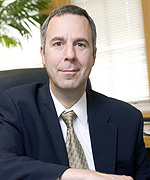 Robert Fefferman |
|
Robert Fefferman, the Max Mason Distinguished Service Professor in Mathematics and the College, and Dean of the Physical Sciences Division, specializes in singular integrals, a field with deep roots in Chicago mathematics.
Singular integrals arise from the solution of equations connected to various scientific problems. The earliest work stems from two Chicago mathematics professors, the late Alberto Calderón (Ph.D.,’50) and the late Antoni Zygmund.
Fefferman’s work has involved certain generalizations of the Fundamental Theorem of Calculus, and connects with the theory of fair gambling games or martingales in probability theory. He also has been interested in applications of these singular integrals to partial differential equations.
Fefferman delivered the Seventh Rubio de Francia Memorial Lecture in Madrid, Spain, and the Riviere-Fabes Memorial Lectures at the University of Minnesota, among other invited talks around the world. His honors include the University’s Llewellyn John and Harriet Manchester Quantrell Award for Excellence in Undergraduate Teaching and a Sloan Foundation fellowship.
In addition to his teaching and research, Fefferman also has been active in mathematics education outreach. Over the past 20 years, he has worked with public school teachers at all levels, from elementary school through high school.
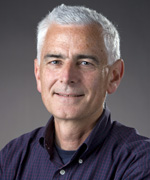 Craig Hogan |
|
Craig Hogan, Professor in Astronomy & Astrophysics and Director of the Center for Particle Astrophysics at Fermi National Accelerator Laboratory, was a member of one of the scientific teams that co-discovered dark energy in 1998. Dark energy is the mysterious force, whose repulsive gravity appears to accelerate the expansion of the universe.
He is currently a member of an international scientific collaboration to design and build the Laser Interferometer Space Antenna. Expected to launch in the next decade, the satellite-based LISA mission will explore and measure the universe using gravitational waves. These waves, never directly detected, are predicted in Einstein’s theory of general relativity. Hogan also is pursuing techniques for probing the quantum nature of space time directly in the laboratory.
Hogan’s honors include the Humboldt Research Award and a Sloan Foundation fellowship. He also is the author of The Little Book of the Big Bang (1998), which has been translated into six languages.
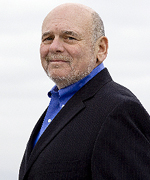 Norman Nie |
|
Norman Nie, Professor Emeritus in Political Science, is one of the nation’s leading scholars in the field of U.S. politics, particularly the study of American political behavior and public opinion.
He joined the faculty in 1968 and served until his retirement in 1998, when he took an appointment at Stanford University.
At Chicago, he authored and co-authored four major books in political science, Participation in America: Political Democracy and Social Equality (1972), The Changing American Voter (1976), Participation and Political Equality (1978) and Education and Democratic Citizenship in America (1996).
He also is known for his contributions toward vastly expanding the use of computers and quantitative data in social science research. Together with two computer scientists, Nie invented a computer software package called the Statistical Package for the Social Sciences. He served as CEO from the company’s founding in 1968 until 1991, and continued as Chairman of the Board and software design consultant until 2008.
Nie co-founded the survey research firm Knowledge Networks in 1997 and continues to serve at its chairman. The company remains the only survey vendor to collect survey data over the Internet using probability samples, placing computers into homes that do not have Internet connectivity.
Nie received his Ph.D. in political science from Stanford University in 1970.
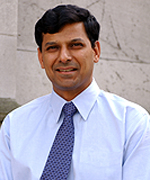 Raghuram Rajan |
|
Raghuram Rajan, the Eric J. Gleacher Distinguished Service Professor of Finance at Chicago Booth, joined the Chicago faculty in 1991. He also currently serves as economic advisor to the Prime Minister of India. In 2003 Rajan took a leave from teaching to serve as the Economic Counselor and Director of Research at the International Monetary Fund, a position he held until 2006.
Rajan’s research interests are in banking, corporate finance and economic development. He has served on the editorial boards of the American Economic Review and the Journal of Finance. He also co-wrote Saving Capitalism from the Capitalists, with Luigi Zingales, the Robert C. McCormack Professor of Entrepreneurship and Finance at Chicago Booth. In January 2003, the American Finance Association awarded Rajan the inaugural Fischer Black Prize, given every two years to a financial economist under age 40 who has made the most significant contribution to the theory and practice of finance.
Neil Shubin, Associate Dean and the Robert R. Bensley Distinguished Service Professor of Organismal Biology & Anatomy, researches the evolutionary origin of anatomical features of animals, specializing in the evolution and developmental biology of limbs.
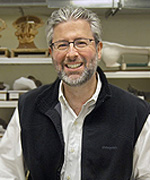 Neil Shubin |
|
He uses his diverse fossil findings to devise hypotheses on how anatomical transformations occurred by way of changes to genetic and morphogenetic processes.
Shubin has conducted fieldwork in Greenland, China, Canada and much of North America and Africa. He has published multiple articles in the Journal of Vertebrate Paleontology and Paleobiology, as well as more than 20 articles in Science and Nature.
Tiktaalik roseae, Shubin’s most recent discovery, has been dubbed a “missing link” between fish and land animals. It generated extensive press coverage worldwide, including an appearance on the “Colbert Report” with Steven Colbert.
Shubin is the author of Your Inner Fish: A Journey Through the 3.5-Billion-Year History of the Human Body, a New York Times bestseller, Amazon Science Book of the Year, and Washington Post Notable Book of the Year.
A John Simon Guggenheim Memorial Foundation fellow, Shubin earned a Ph.D. in organismic and evolutionary biology from Harvard University in 1987. He joined the Chicago faculty as Chairman of Organismal Biology & Anatomy in 2000.
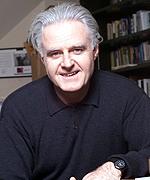 Robert von Hallberg |
|
Robert von Hallberg, the Helen A. Regenstein Professor in Comparative Literature and the College, is a leading authority on modern American poetry.
Von Hallberg’s work deals with the aesthetics and politics of 20th-century poetry in the United States and Germany. His teaching and research focus specifically on postwar American poetry, song lyrics, East German writing (1949-89) and early literary modernism (1909-25) in London, New York, Berlin and Munich.
He is the author of several books, including Charles Olson: The Scholar’s Art, American Poetry and Culture, 1945-1980; Literary Intellectuals and the Dissolution of the State: Professionalism and Conformity in the GDR; and most recently, Lyric Powers.
In addition to teaching at Chicago, he also has taught at Stanford University, the University of Wurzburg and the University of Munich. Von Hallberg has received fellowships from the John Simon Guggenheim Memorial Foundation and the Alexander von Humboldt Foundation as well as the National Endowment for the Humanities. He also has served as a Fulbright Senior Lecturer.
Von Hallberg has served as chairman of Germanic Studies, poetry editor for the University Press and co-editor of Critical Inquiry. With alumnus Lawrence Rainey, he founded and co-edited the journal Modernism/Modernity, published by the Johns Hopkins University.
Von Hallberg, who earned his Ph.D. from Stanford University, is currently writing two books—one on film noir and another on love songs. For the last five years, much of his effort at the University has gone to the Program in Poetry and Poetics.
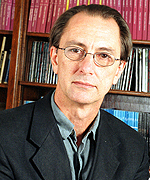 David E. Wellbery |
|
David E. Wellbery, the LeRoy T. and Margaret Deffenbaugh Carlson University Professor in Germanic Studies and Comparative Literature and on the Committee on Social Thought, is a world-renowned scholar of classical German literature and its significance for contemporary theoretical questions.
Upon his arrival at the University in 2001, Wellbery founded the Center for Interdisciplinary Research on German Literature & Culture, which has since emerged as an internationally recognized forum in the field of German Studies.
Wellbery’s books include Lessings’s Laocoon: Semiotics and Aesthetics in the Age of Reason, The Specular Moment: Goethe’s Early Lyric and the Beginnings of Romanticism, and Schopenhauer’s Bedeutung für die moderne Literatur. A collection of his German essays entitled Seiltänzer des Paradoxalen appeared in 2006. Wellbery is editor-in-chief of the monumental A New History of German Literature, published by Harvard University Press in 2004 with a German translation following in 2008. He is also co-editor of the important journal Deutsche Vierteljahrsschrift für Literaturwissenschaft und Geistesgeschichte, and serves on the editorial boards of several other periodicals, including Goethe Yearbook and Comparative Literature.
Prior to joining the faculty at the University of Chicago, Wellbery held professorships at Stanford University and Johns Hopkins University. He has also been honored with guest professorships at the University of Bonn, Princeton University, the State University of Rio de Janeiro and the University of Copenhagen.
He has been a fellow at the Center for Advanced Study (Wissenschaftskolleg) in Berlin and the Carl Friedrich von Siemens Stiftung in Munich. In 2005, he was awarded the Alexander von Humboldt Research Prize, and in 2008 he was elected a corresponding member of the Bavarian Academy of Sciences.
![[Chronicle]](/images/sidebar_header_oct06.gif)